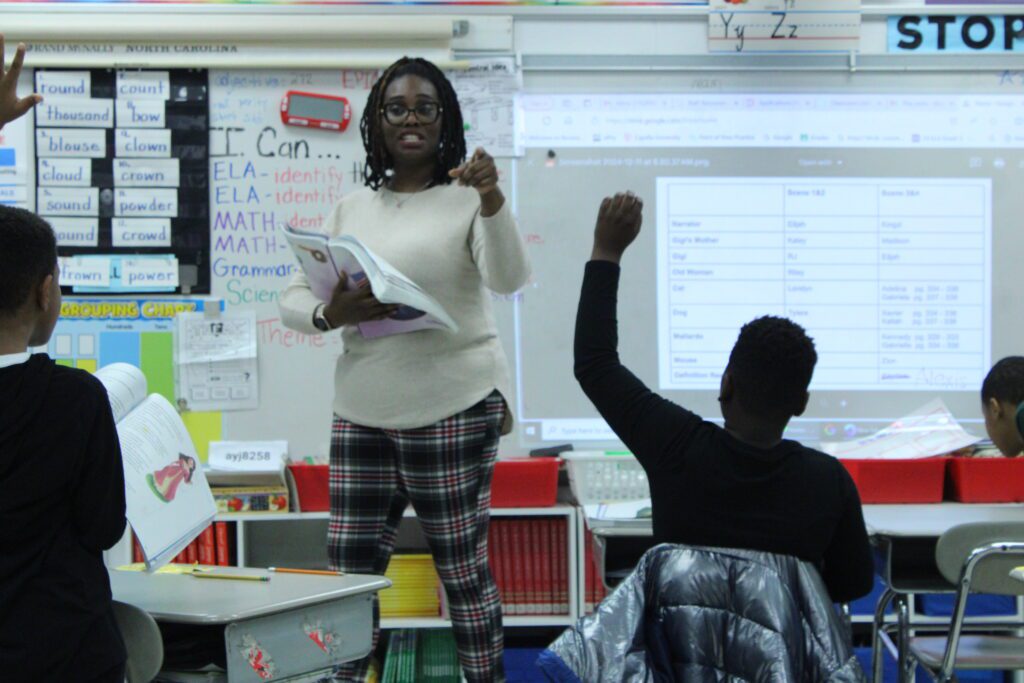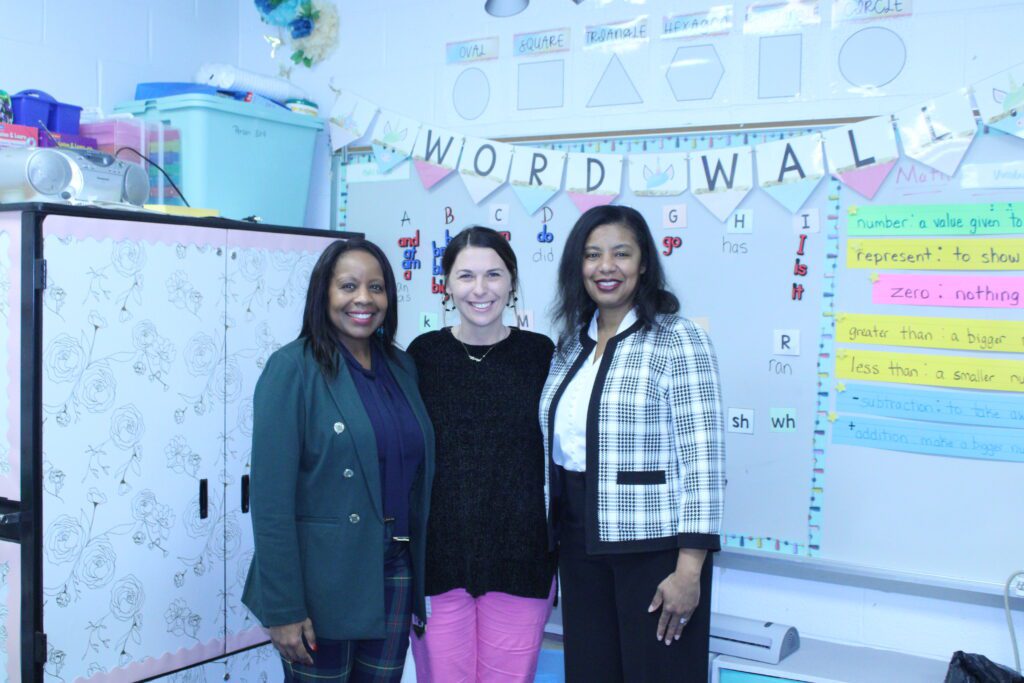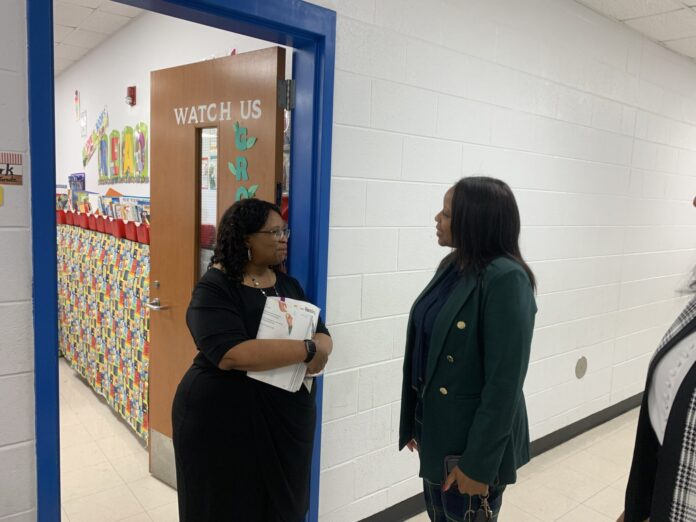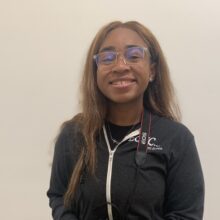Share this story
The students were up and at ’em. The narrator of the bunch read a passage from the play “Gigi and the Wishing Ring,” then came across a word they didn’t know – “imminent.”
Shannon Lamb, a.k.a. Ms. Lamb, a.k.a. K-12 apprentice, walked them through it. “What does that mean?” Lamb asked. “Who do you know in your life that is imminent?”
“Ms. Rivenbark,” the third-graders said, pointing to Lamb’s clinical teacher.
That was just a snapshot of one of Lamb’s days at Tommy’s Road Elementary in the Wayne County Public Schools (WCPS) system, which has begun its first year of operating the Educator Registered Apprenticeship Program. District representatives told EdNC that they are excited to expand their teacher pipeline and support their local economy. Apprentices said they are excited to give back to the community while getting experience before licensure.
Forming the apprenticeship
“I would say first, it starts with everyone coming to the table and agreeing on what they want to achieve and accomplish,” said Felicia Brown, director of human resources at WCPS. “And so that’s what we were able to do with Wayne Community College.”
Wayne Community College (WCC) formed the Apprenticeship Wayne program in 2020. In general, apprenticeships are arrangements where employers provide workers with on-the-job training in a certain field combined with classroom instruction. Students are paid for their time and earn nationally recognized certifications.
In 2022, WCPS became interested in starting an apprenticeship program for K-12 teachers, with a special interest in recruiting high school students. Apprenticeship Wayne partnered with the University of Mount Olive and the Educator Registered Apprenticeship Intermediary, housed under RTI International, in 2023. The role of the intermediary is to apply apprenticeship standards to the needs of the education sector.
“The greatest value-add of the ERA Intermediary was having a thought partner that understood both apprenticeship and education and who could explain how the two work together in the program standards,” Kristie Sauls, executive director of apprenticeships and career development at WCC, said in a news release. “ERA helped us understand braided funding opportunities and clarified the benefits of apprenticeship to prepare future educators.”
Educator Registered Apprenticeships are registered and funded by the U.S. Department of Labor. As of spring 2024, Wayne County Schools became the first district in the state to offer a K-12 apprenticeship program. It’s the second in the nation to receive ERA funding.
Apprentices are required to enroll in an educator prep program at a community college or a four-year university and then have in-classroom training planned around their school schedule. They earn an hourly wage as instructional assistants and receive additional financial support for licensure assessments, assessment preparation, and anything else related to their training that may not be covered by other financial aid sources.
The apprenticeship lasts up to three years. Throughout their time in the program, participants are to be on track to earn an associate degree or bachelor’s degree in a related education field, or teaching license.
Additionally, the apprentice will earn a nationally recognized certificate from the U.S. Department of Labor and the Office of Apprenticeship.
The district had no difficulty finding teaching assistants, Brown said. So programs like the apprenticeship are ways to help build a pipeline through which assistants can become full-time teachers.
When asked about the apprenticeship program’s success compared with the district’s other pathways, Brown said they are still in the “beginning stages” of the program. Their office is getting more and more inquiries as they get the word out.
Into the classroom
If you had needed math tutoring in Wayne County over the past 20 years, you might have been asked to call Angela Lamb.
Lamb insists she is one of those people who always wanted to become a teacher. That passion to facilitate learning is reflected in how she raised her own children.
“I taught all my children how to read before they got to kindergarten, because I just wanted that to be something that is not a hurdle for them, and also dragging out from classroom management to all the other things that teachers have to do,” Lamb said. “I wanted that to be out of the way, because kids can always learn to read, and I’ve always heard it starts at home, so just that joy of seeing kids grow and learn has just always been like, ‘I love this.’ I love everything about it.”
Lamb is now a WCPS apprentice and a North Carolina Teaching Fellows scholarship recipient. She heard about the apprenticeship program while working as an instructional assistant at Edgewood Community Developmental School, which is also a part of WCPS. After four years in special education, she said, it was an opportunity for her to pivot.
Lamb spends three days a week working at the elementary school to fulfill the experience requirements for both the apprenticeship and her degree requirements at East Carolina University. While working, she teaches lessons in reading and math, learns how to monitor student progress, and gets feedback from her clinical teacher, Shannan Rivenbark.
“From the start, she has been enthusiastic and receptive to this tremendous growth opportunity,” Rivenbark said of Lamb. “The additional support that she is receiving from being a part of the apprenticeship program is undoubtedly helping to further her endeavor toward the goal of becoming an effective classroom educator.”
To continue to give back to the community, Lamb said she plans to get a master’s degree and be certified in teaching children experiencing poverty.
“I do want to go back to those schools that have, you know, those students that are dealing with things that are huge outside of school, you know, in their families.” Lamb said. “These are the schools that I grew up in, and so I want to be the teacher that they deserve, that I deserved when I was going, you know, through school.”

‘I am already seeing so much’
As an apprentice in a kindergarten classroom, Kayla Heitrick spends her time working with students at Carver Elementary in small groups or supervising lunch and recess.
So far, Heitrick said, her biggest challenge has been learning how to do what’s best for each student.
“And I guess that’s the main thing, just trying to figure out what works for everybody so that everybody’s learning – and everyone’s having fun learning,” Heitrick said. “Because I think that’s important too, especially with the kindergartners.”
Heitrick said she is being exposed to things as an apprentice that she would not have known about otherwise. For example, she said she has been helping students who have not been in pre-K make the transition into a classroom environment for the first time. Her clinical teacher also has been showing her how to work directly with students and parents who are not native English speakers.
“And I think being in the classroom before becoming a teacher really helped me … because I am already seeing so much, and I feel like the more experienced, the better you know how to handle certain things,” Heitrick said.

Heitrick was working as a dental assistant and a waitress before she heard about the apprenticeship. She realized that she wanted to work with young children while working with pediatric dental patients.
“I like to help people,” she said. “I like to make that difference. And I think it’s important for children to have that firm foundation, and to know, you know, like they feel safe here, like they can come to our room and they feel safe.”
‘We’re here, we’re present’
Yvette Mason, the assistant superintendent of human resources at WCPS, said the district had to jump several hurdles to recruit and retain teachers.
As natives of Wayne County, both Brown and Mason said they are aware of what their school district has to compete with when compared with other districts across North Carolina and even other states. For instance, neighboring counties may offer teachers higher pay supplements.
Plus, many of the teachers who have found a home in Wayne County are aging out.
“So when COVID hit – oh, my God, that was almost like the exit door flew open for everybody to exit out of education,” Mason said. “There was a change in how to teach, you know, with technology and all of those things. So we did see a lot of our teachers that were at that age to retire move out.”
Yet another challenge, Mason said, is the low number of education graduates from local colleges and universities.
“Some of the colleges and universities are not turning out 200 and 300 educators strong like what I graduated with,” Mason said. “It may be a row of teachers graduating from a school of education, or less than that.”
Reports in North Carolina have shown that pay, mentorship, and support for beginning teachers play a factor in how far they go in the profession.
Apprentices said they feel supported both financially and emotionally by the district and their respective programs. Lamb said they have regular meetings and get to speak with beginning teachers about their experiences.
Lamb said that specifically Brown and Mason are there to “talk her off the ledge,” if she needs it.
“You know, (the response) is, ‘We’re coming to just support you and let you know that we’re here, we’re present,’ and that’s something that I wouldn’t get as just a regular intern,” Lamb said.





